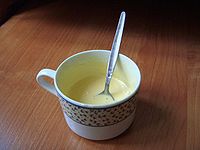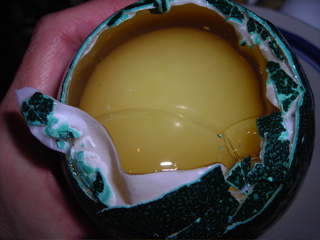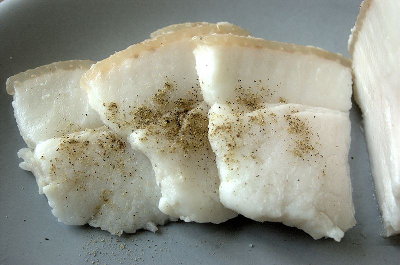Categories: "Food"
Пить
The Russian verb “to drink” is пить/выпить. It conjugates like this:
| to drink | ||
| Imperfective | Perfective | |
| Infinitive | пить | выпить |
| Past | пил пила пило пили |
выпил выпила выпило выпили |
| Present | пью пьёшь пьёт пьём пьёте пьют |
No such thing as perfective present in Russian. |
| Future |
буду пить будешь пить будет пить будем пить будете пить будут пить |
выпью выпьешь выпьет выпьем выпьете выпьют |
| Imperative | пей(те) | выпей(те) |
The drinker appears in the nominative case, and the thing drunk shows up in the accusative case:
| Пей тёплое молоко перед сном. Ты будешь лучше спать. | Drink warm milk before going to sleep. You'll sleep better. |
| Врачи советуют пить восемь стаканов воды каждый день. | Doctors recommend drinking eight glasses of water a day. |
Just as in English, if you use drink without any particular object, it implies drinking alcoholic beverages:
| — Ты пьёшь? — Нет, не пью. |
“Do you drink?” “No, I don't.” |
| — Твой брат не пьёт? — Нет, не пьёт. Поэтому он такой здоровый. И поэтому девушки от него без ума. |
“Doesn't your brother drink?” “No, he doesn't. That's why he is so healthy. And that's why the girls are so crazy about him.” |
In English we talk about “taking medicine,” whereas in Russian you usually take about “drinking medicine.” The implication is that the medicine is swallowed «с водой» “with water.”
| Не люблю пить лекарства. | I don't like to take medicine. |
| Даша выпила две таблетки аспирина, и головная боль прошла. | Dasha took two aspirin, and her headache went away. |
Гоголь-моголь
Some words always bring a smile to my face, like higgledy-piggledy, hurlyburly, hullabaloo, and floccinaucinihilipilification. Now I have a new one from Russian: гоголь-моголь.
| Гоголь-моголь is a dish made of raw egg yolks beaten with sugar. If your daughter has a sore throat and doesn't like to take medicine, then you feed her гоголь-моголь and soon everything will will be better. |  Photo courtesy of Wikipedia |
| Самый простой рецепт: взбить пару желтков яиц с сахаром и принимать натощак по утрам по две чайные ложки. (source) | The simplest recipe: beat a couple of egg yolks with sugar. Take two teaspoons in the morning on an empty stomach. |
Even Doctor Aibolit, the Russian equivalent of Doctor Doolittle, treated his animals with it:
| И к полосатым Бежит он тигрятам. И к бедным горбатым Больным верблюжатам, И каждого гоголем, Каждого моголем, Гоголем-моголем, Гоголем-моголем, Гоголем-моголем потчует. |
And he runs to the striped tiger cubs And to the poor, sick, Hump-backed camel cubs And he offers each gogol And he offers each mogol Gogol-mogol Gogol-mogol He treats them to gogol-mogol |
Гоголь-моголь is considered a cultured and refined dessert, worthy of being served in aristocratic homes. It may be flavored with chocolate or vanilla or coffee, made with fruit juices or pureed fruit, or even served in bars as a cocktail.
Яйца
Last month Tanya and I drove from Phoenix to Las Vegas, where we stayed at my father's house. In the morning we went to the casino around the corner to have breakfast, which has long been one of my father's daily habits. Despite having lived in the States for 13 years, Tanya had never gone out for breakfast here, so when the waitress asked, “How would you like your eggs?”, Tanya didn't really recognize the question and didn't have the vocabulary in English to answer. And when I wracked my brains for the Russian terms, only two came quickly to mind. That means it's time to blog about eggs!
Let's start with the basic declension. Notice that the й becomes a full-fledged и in the genitive plural:
| Sg | Pl | |
| Nom | яйцо | яйца |
| Acc | ||
| Gen | яйца | яиц |
| Pre | яйце | яйцах |
| Dat | яйцу | яйцам |
| Ins | яйцом | яйцами |
Russians usually eat chicken eggs, just like Americans. That's a shame. It would be much more interesting if they ate emu eggs:

| Скорлупа яйца эму бывает зелёного цвета. Одно яйцо может весить полкило. | Еmu egg shells are usually green. One egg can weigh half a kilo. |
Russians in Russia never go out for breakfast. Diners that serve an early morning breakfast are standard Americana but are simply not part of the Russian milieu. Why would you get up so early and pay excessive money for what you can eat more cheaply at home? But of course even at home you prepare your ordinary chicken eggs куриные яйца a dozen ways, so how do the Russians describe them? Probably the most generic phrase is яичница, which means eggs fried in almost any fashion. Then there is омлет, which can mean either scrambled eggs or an omelet, and it may or may not include milk or flour or sugar mixed in. Other options:
| Бабушка всегда варила яйца всмятку. | Gramma always made soft-boiled eggs. |
| Сегодня утром на завтрак папа подал яйца вкрутую. | This morning Dad served hard boiled eggs for breakfast. |
| В американских ресторанчиках часто заказывают яичницу-глазунью. | In American diners people often order eggs sunny side up. |
| Яичница-болтунья — это одно из самых простых блюд для поваров-новичков. | Scrambled eggs is one of the simplest dishes for beginning cooks. |
| Взбей мне пару яиц. (source) | Scramble me up a couple of eggs. |
| Взболтай мне пару яиц. |
Last but not least, there is a song called «Яйца» by Дискотека Авария, a pop-music group known for their humorous lyrics. You can view the song and a translation here. If you find yourself scratching your head about why this song is funny, it's because we've not mentioned one little fact: colloquially яйца also means testicles.
Сало
Some years ago I read a book entitled “Scandinavian Humor and Other Myths,” which had the following insight: every ethnic group has some food to which it is irrationally attached. In the case of Scandinavians it is lutefisk. The Scots revel in abominable haggis, and the Mexicans in menudo.
For the Russians that food is сало. No comestible could be more perfectly designed to arouse fear and loathing in American hearts. It is essentially a chunk of fat from the back or belly of a pig. The сало may be smoke-cured, brine-cured, or salted. You can then eat it raw, or it can be chopped up small, fried, and served as a condiment. The first time that I had it, it was simply served raw in little white chunks on a plate, and I was incredibly grateful that my host had some Bulgarian sauce to pour on it, otherwise I don't think I could have kept it down. And if you take a slice of it and put it on some rye bread that has been rubbed with garlic, it is the perfect accompaniment to shots of vodka (source). Sometimes it is sprinkled with black pepper to make it pretty:
 Picture courtesy of Wikipedia
Picture courtesy of WikipediaDoesn't that look yummy? A marvelous article on сало can be found at appetissimo.ru, which lets us know that сало won't make us fat or clog our arteries and really should be consumed with hooch. And if you read Ukrainian, don't miss out on the Salo Lovers Club.
Here are some sample sentences.
| Я люблю пожарить кусочки сала и есть их на хлебе с маслом. | I love to fry up pieces of fatback and eat them on bread with butter. |
| — Мне холодно. — Это потому, что ты такая худенькая. Тебе надо сало есть. Ты будешь здоровее и не будешь чувствовать холода. |
“I'm cold.” “That's because you are so skinny. You need to eat fatback. You'll be healthier and won't feel the cold.” |
| — Ты слышал, что одесский завод производит сало в шоколаде? — Слышал, но в действительности это лишь карамель с привкусом сала, а не настоящее сало. |
“Did you hear that a factory in Odessa produces fatbook covered with chocolate?” “I did, but really it is only caramel with some fatback flavoring, not real fatback.” |
| — Ой, как я пьян! — Это потому, что не умеешь пить. Между рюмками надо закусывать хлебом с салом. Таким образом пьют здоровые люди. |
“Oh, I am so drunk!” “That's because you don't know how to drink right. Between shots you have to eat bread and fatback. That's how healthy people drink.” |
Пудинг
Somewhere on the North American continent there is a gringo who has studied Russian who someday will see the word пудинг and immediately think of Bill Cosby and his Jello pudding commercials. Nope, Russian pudding is not that. The dictionary at gramota.ru describes it like this:
| Запеканка из крупы или муки, творога, мяса и т.п. с добавлением яиц, молока и разных пряностей. | A baked pudding made of grain, flour, farmers cheese or meat, etc., combined with eggs, milk, and various spices. |
One of the best пудинги of all time is творожный пудинг “farmers cheese pudding,” which is essentially a Russian cheesecake. Best of all, it's considered a dietetic dish that is especially healthy for children. If it's good for kids and can also be part of a meatless lifestyle, it obviously must be very healthy for adults, too! And what's even more interesting is that this cheesecake is made with «манная каша» “Cream of Wheat.” Doubtless you are now consumed with a desire for healthy cooking, so this link takes you to a bilingual recipe which I snagged from supercook.ru, and this link takes you to my cooking blog to see how I adapted it for personal production.
One last comment: I first encountered творожный пудинг in 1986 at Московский государственный университет. In the basement of the main building there was a shop that sold it along with other food items. They must have chosen the word пудинг because of the exotic sound of the word to the Russian ear. Students at МГУ could be counted on to be sophisticated enough to deal with that sort of thing, right? But really ordinary Russians almost never use the word пудинг. Instead they call this dish творожная запеканка.